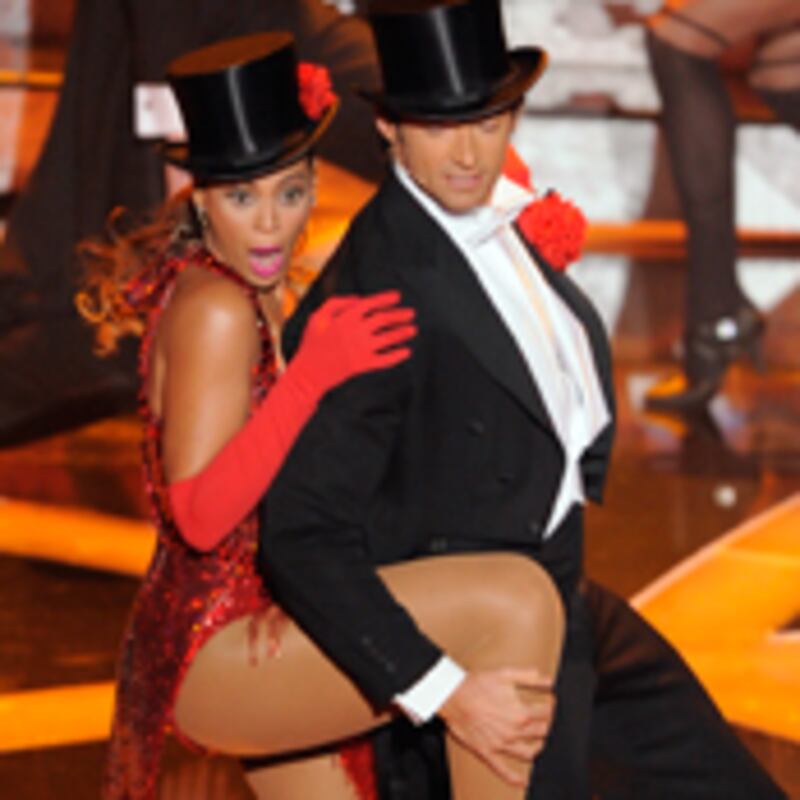Plus: Check out our Oscars page for more news on the awards, the nominees and the glam.

About an hour into this year’s Academy Awards ceremony, we were treated to a short film by Judd Apatow, which was like a window onto Hollywood’s current, fraught psychic condition—not to mention the harried state of ABC, the ratings-hungry network that broadcasts the awards.
In it, two slackers, played by James Franco and Seth Rogen, sit on a couch in their basement and watch this year’s nominated films. Naturally, they just don’t get it. But they don’t get it in a very vivid way. Whenever a wrenching dramatic scene unfolds on the screen—they see moments from The Reader and Doubt—they throw their heads back and laugh hysterically. Even the scenes of violence and mayhem that get them jumping up and down don’t really click with them so much as seem to remind them of a videogame.
The fear that movies are losing their audience—and that the studios will go the way of Atlantis—might well have explained the Academy’s unconscious attraction to Apatow’s little divertisement. It certainly explained why this year’s Awards were possibly the most tedious, even grating ceremony in Oscar history.
What in heaven’s name does The Graduate have to do with The Reader? Oh, here’s to you, Mrs.… Eichmann?
Apparently, Hollywood is so terrified of the digital future, and the economic future, and of a future in which movies just don’t have the cultural relevance they used to, that the organizers of this year’s fiasco desperately seized on a whole new format. It was a disaster, from the stiff, charmingly charmless Hugh Jackman; to the ridiculous song-and-dance numbers—what’s the point of putting Beyoncé in a Busby Berkeley floor show?; to the idea of having five previous winners in the acting categories sing the praises of each nominee instead of showing clips of their performances; to the absolutely ludicrous decision to splice scenes from earlier films into clips from the nominees for Best Picture. (What in heaven’s name does The Graduate have to do with The Reader? Adultery with a monstrous suburban matron is not the same thing as an affair with a monstrous former concentration-camp guard. Oh here’s to you, Mrs.… Eichmann?)
Hollywood’s fear of being superceded made the Academy draw round its wagons and spend the night in an insular circle-jerk. The idea behind having a comedian host the Awards—Jon Stewart, Chris Rock, Billy Crystal, Steve Martin et al.—was always to bring out someone who would lampoon the glittering audience and thus make the exclusive setting accessible to ordinary viewers across the country. Instead, Jackman started off by trading intimacies with all the stars in the front row, even celebrating himself at one point as the world’s best-dressed man—or whatever he is—in his clumsy homage to Brad Pitt.
It was all downhill from there, one of the few truly entertaining moments being the badinage between presenters Tina Fey and Steve Martin. For the rest, it was one self-celebration after another, as famous actors like Anthony Hopkins, Robert DeNiro, and Sophia Loren (just seeing her was one consolation for staying tuned for over three hours) were reduced to puffing up the nominees each one was assigned to introduce. Some presenters, like Anthony Hopkins to Brad Pitt, seemed at a loss for coherent words.
I’m glad Mickey Rourke lost, sorry but hardly surprised that Frank Langella didn’t get it, appalled yet again by Sean Penn’s smugness and arrogance—he was so caught up with bravely flaunting his opposition to Prop 8 (you could just see the entire foreclosed, unemployed, defrauded, confused, and frightened country roll its eyes) that he didn’t thank his wife, his children, or anyone unrelated to him professionally in his acceptance speech. He did, though, make sure to offer a conciliatory hand to Rourke, whom he called “my brother.” Penn’s private drama.
So much was predetermined—Winslet, Slumdog Millionaire, Ledger, Slumdog Millionaire, Slumdog Millionaire, Slumdog Millionaire—and so much that was predetermined was so far from the iconic scenes and figures invoked throughout the night—Paul Newman, come back!—that you were grateful for small blessings: a wonderfully down-to-earth and spontaneous Danny Boyle, Slumdog’s humanly real creators and collaborators, an enchanting Philippe Petit.
No wonder the show’s main sponsor was JC Penney, who it seems is embarking on an ad campaign to rebrand itself from a downscale discount outlet to an upscale discount outlet. Deep down, Hollywood thinks of itself as Bergdorf Goodman, but the slightest portent of failure sends it into hysterial fantasies of becoming JC Penney. As the credits rolled after the Awards finished, the Academy had ABC actually broadcast trailers of upcoming films in 2009. It was like watching a nervous breakdown. Next year in Mumbai?
Lee Siegel has written about culture and politics for numerous publications. He is the author of three books: Falling Upwards: Essays in Defense of the Imagination; Not Remotely Controlled: Notes on Television and, most recently, Against the Machine: Being Human in the Age of the Electronic Mob. In 2002, he received the National Magazine Award for reviews and criticism.






